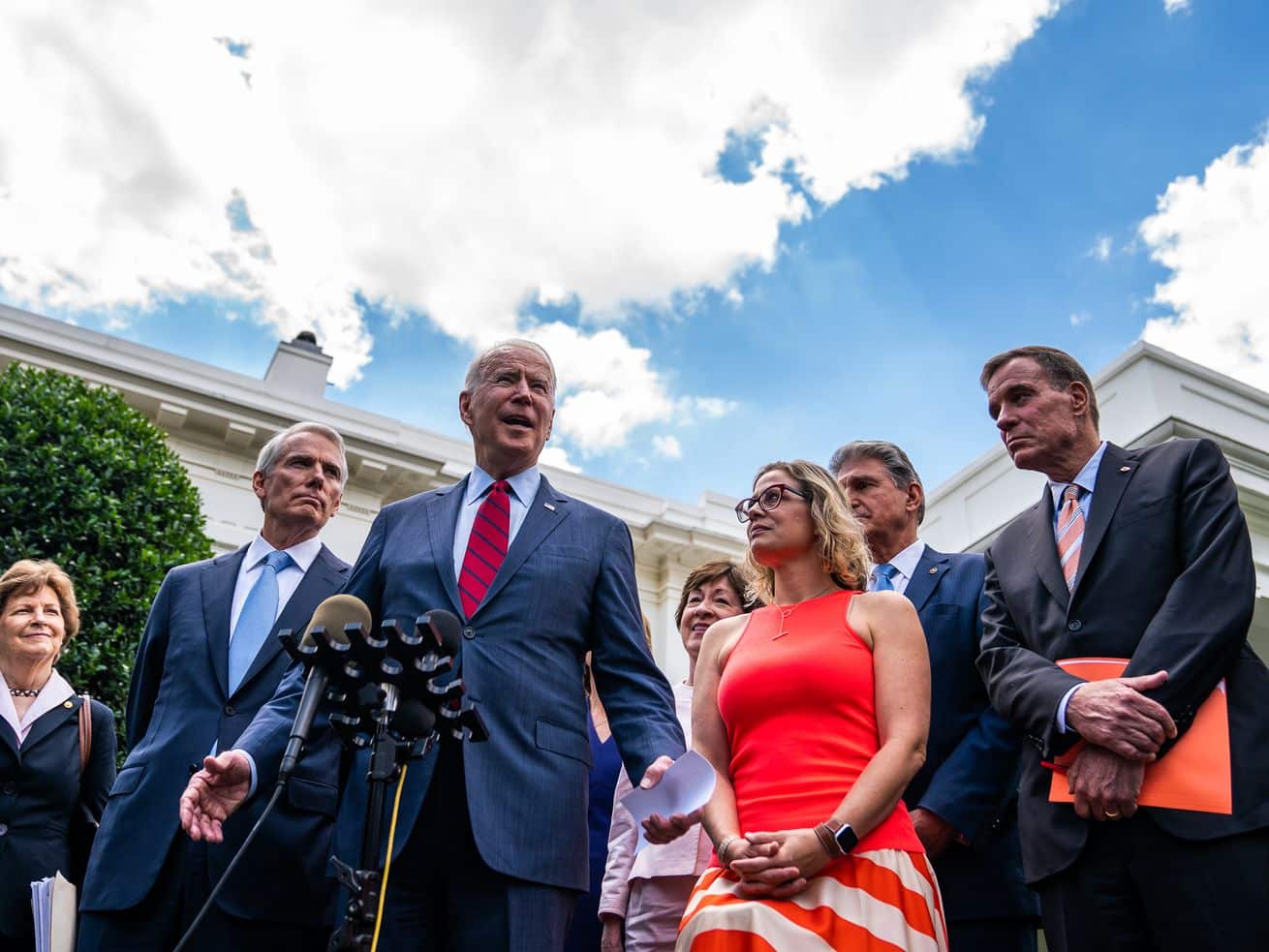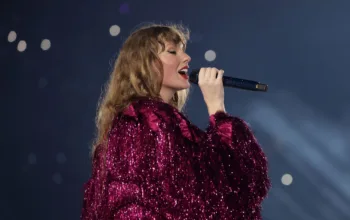Democrats’ quest for bipartisanship comes with big trade-offs.
When it comes to infrastructure, a handful of moderate Senate Democrats have been intent on one thing: bipartisanship.
This focus speaks to a commitment to compromise as well as potential electoral considerations — since voters can reward moderate lawmakers who reach across the aisle. It has other major implications, however, limiting the types of policies Democrats can pass and leading the party to spend time on negotiations that Republican leadership ultimately may not support.
With infrastructure, bipartisan compromise has meant capping spending for provisions addressing electric vehicles and broadband at much lower levels than President Joe Biden’s original request, changes that won’t be made up in reconciliation. And as Democrats have sought out bipartisanship on other areas like police reform and gun control, they’ve similarly had to weigh major policy trade-offs.
Last week, Democrats were able to reach an infrastructure agreement that has the backing of 11 Senate Republicans as well as Biden, a longtime champion of bipartisanship. The $1.2 trillion framework includes significant spending on roads, bridges, and transit — though it omits other Democratic priorities like money for long-term care and climate research funding. Overall, it includes $579 billion in new spending, compared to Biden’s American Jobs Plan, which originally contained about $2 trillion in new spending.
The deal and other ongoing negotiations are a product, in part, of the narrow margins Democrats have in the upper chamber: Sen. Joe Manchin (D-WV), a key Democratic vote, previously said he wouldn’t consider passing a partisan infrastructure package on its own, forcing the consideration of a bipartisan option.
The alternative to bipartisan legislating would be to govern through the reconciliation process, by which policy changes affecting the federal budget can be implemented with a simple majority. Democrats successfully used reconciliation to pass a sweeping coronavirus relief package in March but have been unable to do the same on infrastructure because they need every vote in their 50-person caucus to proceed.
Given Manchin’s opposition, Democrats didn’t have the votes to approve a reconciliation proposal, so they’ve forged onward with both a bipartisan bill that includes policies both parties agree on, and are attempting to put together a separate budget bill containing infrastructure policies the GOP has rejected (but that the Democratic caucus supports).
Let me be clear: There will not be a bipartisan infrastructure deal without a reconciliation bill that substantially improves the lives of working families and combats the existential threat of climate change. No reconciliation bill, no deal. We need transformative change NOW.
— Bernie Sanders (@SenSanders) June 27, 2021
Democrats are expected to vote on both bills at the same time in order to make sure they move the party’s key policies in addition to those that have Republican backing. This parallel partisan effort is important to a lot of lawmakers because there are many provisions that the bipartisan plan leaves out, including child tax credits, paid leave, and a clean electricity standard. Progressive Democrats, in particular, are hopeful that any reconciliation measure will address these gaps.
“We as Democrats were elected to pass a big and a bold agenda on climate, on environmental justice, on creating clean energy jobs by the millions, and this bipartisan bill does not do that, so there’s much work left to be done,” Sen. Ed Markey (D-MA) recently told reporters.
Ultimately, the bipartisan infrastructure agreement is indicative of the limits of working across party lines: To please a wide range of senators, popular policies with bipartisan voter support — like funding for long-term care — fell by the wayside, while funding for areas both parties agree on was also slashed significantly. What is left are policies that are less ambitious than those Democrats could advance on their own.
It also meant delays: Bipartisan negotiation takes time — the infrastructure deal, which remains fragile, took months to come together — and the window for advancing legislation is narrowing ahead of the 2022 midterms. With an August recess, debt ceiling negotiations, and the need to approve more appropriations looming, Congress really only has a limited legislative time left before members begin campaigning in earnest.
With respect to infrastructure, Democrats will still have their chance to include some of their priority provisions in their reconciliation bill, an approach that’s not tenable for several other policy areas.
“On infrastructure, you have the ability to pass something with 50 votes; on guns, you don’t. So for now, I have to find 60 votes on guns,” Sen. Chris Murphy (D-CT) told Vox. “Yes, it risks diluting what I would do if it was up to me alone, but that’s my only path.”
Democrats face a similar issue on subjects like police reform; they simply don’t have the 60 votes needed to overcome a possible filibuster. So as long as the legislative filibuster is in place, the party will be forced to seek Republican support on legislation — and deal with all the trade-offs that come with it.
Why moderate Democrats are so focused on bipartisanship
Democrats’ stated reasons for pursuing bipartisanship on infrastructure include showing constituents that Congress can still work together across party lines, aspiring to a kind of vaunted ideal and delivering results supported by a broad base of voters.
For some, there could be electoral reasons, too.
As the Hill reported, Democrats in tough seats that are up for reelection in 2022 like Sens. Mark Kelly (AZ) and Maggie Hassan (NH) are among those who have backed the bipartisan infrastructure proposal. Their work on bipartisan agreements could be a way to signal that they’re able to reach across the aisle and represent voters across parties, potentially reaching independents and moderate Republicans.
“I think it’s always important when we can do things in a bipartisan way to reflect the way our constituents do things. They work together without regard to political party all the time and there’s large bipartisan support for infrastructure,” Hassan told the Hill.
Research by Dartmouth University political scientist Sean Westwood has found that lawmakers associated with bipartisan bills may get a boost in competitive districts during general elections, though it’s less beneficial at the primary stage.
“Bipartisanship is really only beneficial to representatives who need to appear centrist to the full electorate and who don’t have to worry about being primaried,” he told Vox. If they make it past their primaries, Kelly and Hassan are among the Democrats expected to face difficult general elections, and could perhaps benefit from any boost a bipartisan record might provide.
Bipartisanship hasn’t just been a focal point in Senate races: According to a 2020 study by the Democratic donor and strategy group Way to Win, House Democrats spent three times as much as Republicans on ads stressing bipartisanship outreach, to limited success.
Democrats overall are also at a disadvantage due to how electoral maps are drawn, according to Kyle Kondik of Sabato’s Crystal Ball — and that’s another factor that may prompt them to seek out and emphasize bipartisanship in their messaging more than Republicans do.
“Republicans have advantages on the overall electoral map — at this particular point in time, the median electoral vote, House district, and Senate seat votes to the right of the nation as a whole,” says Kondik. “This is probably part of the reason why the Democrats feel obligated to talk about bipartisanship more than Republicans.”
Past polling has affirmed voter support for bipartisanship as well, though researchers have also found that voters prefer when the party they aren’t aligned with is forced to make concessions, according to FiveThirtyEight.
Further complicating things, per polling from Vox and Data for Progress, many voters don’t have a clear sense of which bills were bipartisan. Earlier this year, Republicans capitalized on this confusion to claim credit for the American Rescue Plan, which every GOP senator voted against. That package also picked up strong support from voters in both parties despite the lack of Republican backing, prompting Biden to describe bipartisanship as support from Democratic and Republican voters, rather than lawmakers.
Republicans have less incentive for bipartisanship
While Democrats are constrained by the size of their caucus and look to bipartisanship to advance what results they can, Republicans are motivated to obstruct such progress in order to prevent Democrats from claiming credit for new policies.
“Because they have narrow majorities, [Democrats] need bipartisanship to produce a record of success,” says Northwestern University political science professor Laurel Harbridge-Yong. “By contrast, when it comes to party competition for majority control, Republicans don’t want the Democrats to have a record of success.”
Senate Minority Leader Mitch McConnell has said as much. “One hundred percent of my focus is on stopping this new administration,” McConnell said at a press conference this spring. “What we have in the United States Senate is total unity from Susan Collins to Ted Cruz in opposition to what the new Biden administration is trying to do to this country.” McConnell later caveated his comments slightly, noting: “I’m anxious on stopping the Biden agenda — depending on what it is.”
His statements highlight how Republican leadership is approaching bipartisanship: Part of their efforts to retake the majority rely on arguing that the current Democratic majority has fallen short.
“Importantly, [voters] will blame the party in power for the dysfunction, not the minority party obstructing,” says Roosevelt University’s David Faris. “McConnell and his allies know this and it’s why they are luring Democrats into a seemingly endless series of negotiations that all seem to end in calamity, except for with things that neither party’s base particularly cares about.”
The Senate has passed a series of bipartisan bills this term including an extension of the Paycheck Protection Program, which gave small-business owners more time to apply for funding; the Innovation and Competition Act, which invests in tech research and development; and the Covid-19 Hate Crimes Act, which aims to gather more data on anti-Asian hate crimes. All of these bills are notable but don’t mark additional progress on some of Democrats’ landmark promises to protect voting rights or address gun control, making them difficult for members of the party to run on — and of less consequence for Republicans to support.
Bipartisanship comes with big trade-offs
Any bipartisan deal is likely to include major trade-offs.
The infrastructure compromise, for instance, is significantly smaller than what Biden had originally proposed in the American Jobs Plans, coming in at $1.2 trillion instead of $2.3 trillion. Additionally it doesn’t include “human infrastructure” and climate provisions like support for clean energy manufacturing, which were central to the original American Jobs Plan.
And even in certain areas of overlap, funding across the board is very different, Politico Playbook reports:
Biden wanted $157 billion for electric vehicles. The bipartisan bill spends $15 billion. He wanted $100 billion for broadband, and he secured $65 billion. From the White House’s perspective, these issues are now resolved and the reconciliation bill can’t be used to take another crack at them.
In the case of infrastructure, Democrats have an opportunity to push for the inclusion of some additional provisions in a reconciliation bill, though that’s not an option on several other policy areas because this process can be used only on policies affecting the budget.
This means that on issues like police reform, for instance, a bipartisan agreement is needed, and is poised to be far less ambitious than the George Floyd Justice in Policing Act, a measure Democrats introduced that already falls far short of what activists wanted.
As is the case with gun reform, though, a bipartisan agreement is the only way that Democrats are able to advance police reforms at this time. “You can’t do police reform through reconciliation; you need a bipartisan deal,” Sen. Cory Booker (D-NJ), a lead police reform negotiator, told Vox. “It’s the only way to get things done.”
“If Democrats had 60 votes, they would pass through something far more sweeping,” says Cook Political Report’s Jessica Taylor of various bills.
Progressive activists emphasize that a bipartisan result doesn’t necessarily guarantee that a policy will have positive outcomes or effectively help people, and that in some cases it runs the risk of a watered-down measure that doesn’t do enough.
“There’s long been a gospel in Washington, DC, that things are better with bipartisanship. There are bad ideas that are bipartisan. There are good ideas that are bipartisan,” says Indivisible’s Leah Greenberg.
In addition to leading to an uncertain result — if a result is reached at all — and the dilution of certain policies, another cost of the focus on bipartisanship is simply time. Prior to the announcement of an infrastructure agreement, discussions had dragged on for weeks, prompting comparisons from some Democratic operatives to the deliberate delays lawmakers experienced in 2009 with the Affordable Care Act, NBC News reports. Back then, Democrats’ efforts to seek out bipartisan support wound up pushing the passage of the bill and didn’t ultimately work out.
“When you look back on my ACA days, it should’ve been apparent to us at the time. We waited too long,” President Obama’s former deputy chief of staff Jim Messina told NBC News.
This has been the case with other policy areas, too: Gun control talks have proceeded haltingly since the beginning of this term, and police reform negotiations have stretched for more than a year. With so little time before campaigning begins for next year’s election, Democrats are pressed to deliver results in the coming months. And it’s unclear how much they will have to show voters.
The infrastructure agreement, for instance, is far from a done deal and remains vulnerable to Republican objections over budget concerns as well as the plan to couple it to a partisan reconciliation bill. Police reform negotiators, too, say they have arrived at a framework, but they have missed two deadlines on offering specifics.
All this means the biggest trade-off of all would be if Democrats fail to advance the policies their voters hope for as some members hold out for an ability to claim bipartisanship — putting the party’s control of the upper chamber in jeopardy as a result.
Author: Li Zhou
Read More



